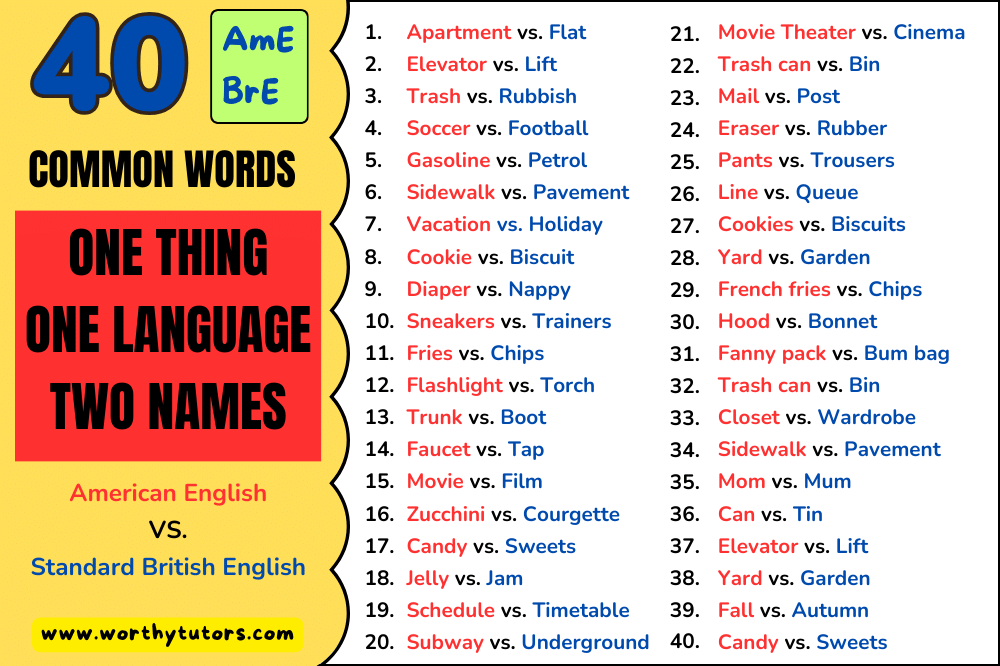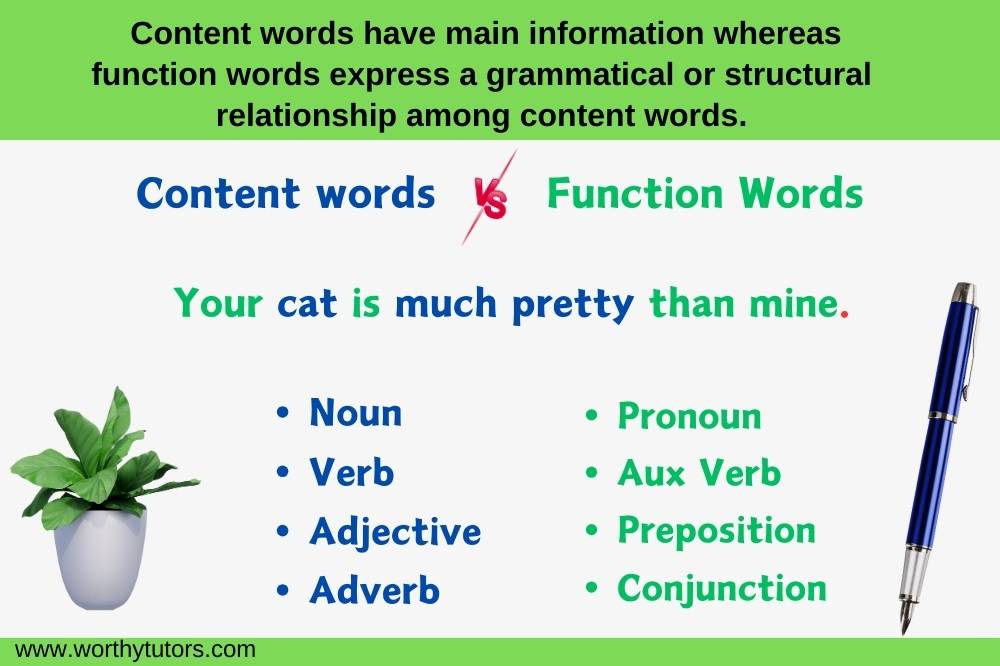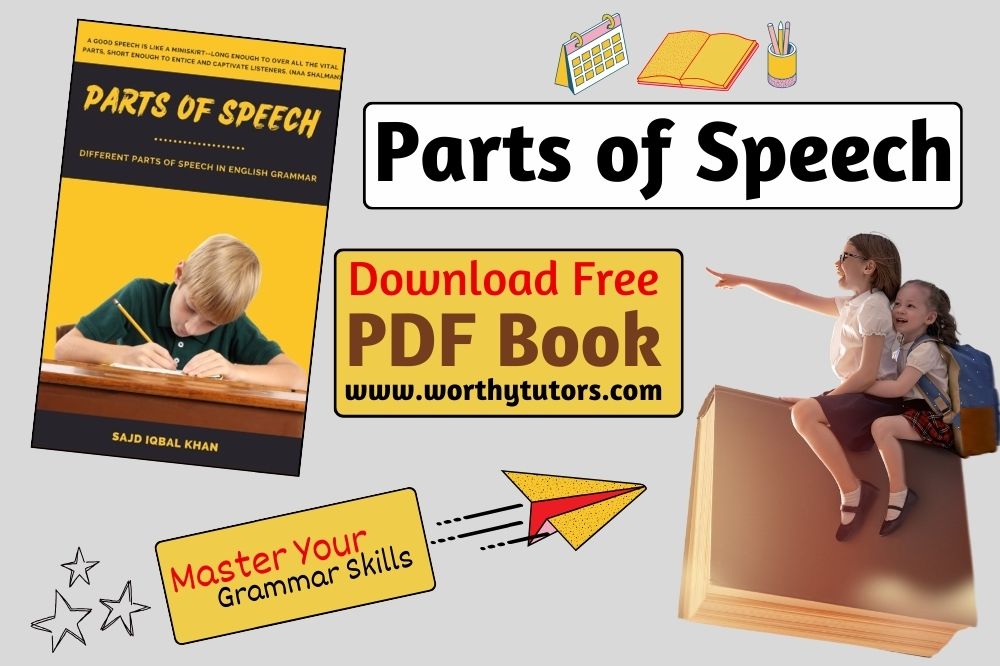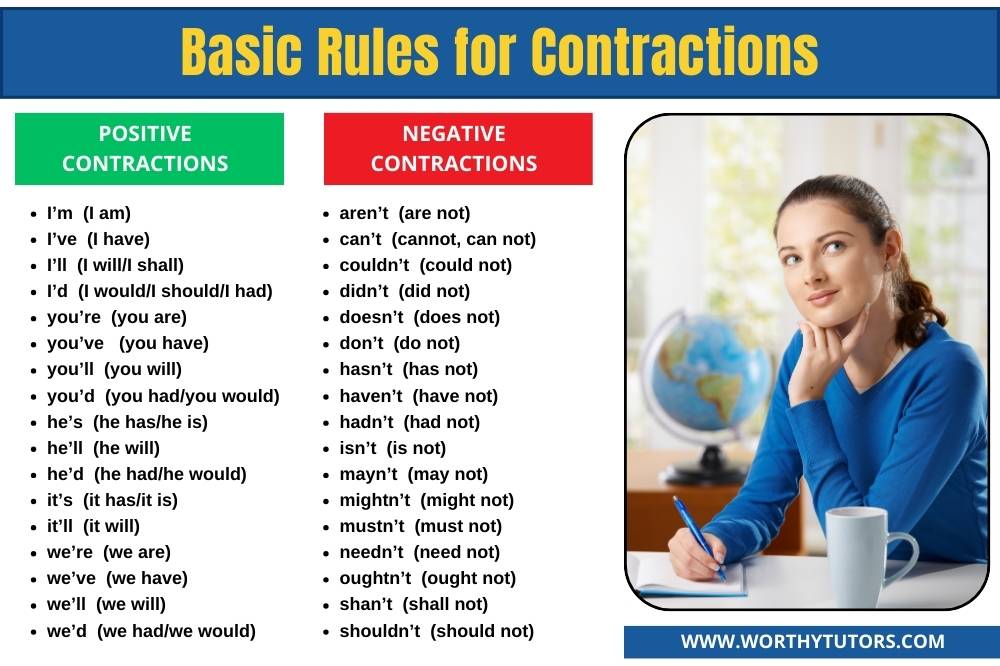
Common words that people use differently for the same things in American English and Standard British English.
English Language is a global language these days and constantly evolving and adapting to its speakers’ needs and contexts. One fascinating aspect of English language is its variation across regions and cultures. One notable example of this variation is the difference between American English (AmE) and British English (BrE). Despite sharing a common origin, these two variants have developed distinct vocabularies, often leading to confusion and amusement among ESL learners. In this article, we’ll explore common words that people use differently for the same things in American English and Standard British English.
Here’s a list with common words that people use differently for the same thing in American English (USA) and Standard British English (UK):
Apartment vs. Flat:
In the United States, “apartment” is commonly used to refer to a self-contained housing unit within a larger building. Conversely, in the United Kingdom, the term “flat” is preferred for the same concept.
Elevator vs. Lift:
Americans take the “elevator” to ascend or descend floors in a building, while British opt for the term “lift” to describe this vertical transport device.
Trash vs. Rubbish:
“Trash” is the go-to term for waste material in American English, whereas “rubbish” is the preferred term in British English.
Soccer vs. Football:
In the United States, the sport involving kicking a ball into a goal is referred to as “soccer,” while in the United Kingdom, it is commonly known as “football.”
Gasoline vs. Petrol:
Both refer to the fuel used in cars, but “gasoline” is used in American English, and “petrol” is used in British English.
Sidewalk vs. Pavement:
Both refer to the footpath beside the road, but “sidewalk” is used in American English, while “pavement” is used in British English.
Vacation vs. Holiday:
Both mean a period of leisure or travel, but “vacation” is used in American English, while “holiday” is used in British English.
Cookie vs. Biscuit:
Both describe a sweet baked treat, but “cookie” is used in American English, while “biscuit” is used in British English.
Diaper vs. Nappy:
Both refer to the absorbent garment worn by babies, but “diaper” is used in American English, while “nappy” is used in British English.
Sneakers vs. Trainers:
Both describe footwear for sports or casual wear, but “sneakers” is used in American English, while “trainers” is used in British English.
Fries vs. Chips:
Both refer to thinly sliced and fried potatoes, but “fries” is used in American English, while “chips” is used in British English.
Flashlight vs. Torch:
Both describe a portable light source, but “flashlight” is used in American English, while “torch” is used in British English.
Trunk vs. Boot:
Both refer to the storage compartment at the rear of a car, but “trunk” is used in American English, while “boot” is used in British English.
Faucet vs. Tap:
Both describe a device for controlling the flow of water, but “faucet” is used in American English, while “tap” is used in British English.
Movie vs. Film:
Both refer to a motion picture, but “movie” is used in American English, while “film” is used in British English.
Zucchini vs. Courgette:
Both refer to a green vegetable, but “zucchini” is used in American English, while “courgette” is used in British English.
Candy vs. Sweets:
Both describe sugary treats, but “candy” is used in American English, while “sweets” is used in British English.
Jelly vs. Jam:
Both describe fruit preserves, but “jelly” is used in American English, while “jam” is used in British English.
Schedule vs. Timetable:
Both refer to a plan of activities, but “schedule” is used in American English, while “timetable” is used in British English.
Subway vs. Underground:
Both refer to an underground railway system, but “subway” is used in American English, while “underground” is used in British English.
Cilantro vs. Coriander:
Both refer to the same herb, but “cilantro” is used in American English, while “coriander” is used in British English.
Trash can vs. Bin:
Both refer to a container for waste, but “trash can” is used in American English, while “bin” is used in British English.
Mail vs. Post:
Both refer to letters or parcels sent through the postal system, but “mail” is used in American English, while “post” is used in British English.
Fanny pack vs. Bum bag:
Both describe a small pouch worn around the waist, but “fanny pack” is used in American English, while “bum bag” is used in British English.
Pants vs. Trousers:
Both refer to the lower-body garment, but “pants” is used in American English, while “trousers” is used in British English.
Line vs. Queue:
Both refer to a sequence of people waiting for something, but “line” is used in American English, while “queue” is used in British English.
Eggplant vs. Aubergine:
Both refer to the same purple vegetable, but “eggplant” is used in American English, while “aubergine” is used in British English.
Yard vs. Garden:
Both refer to an outdoor area around a house, but “yard” is used in American English, while “garden” is used in British English.
French fries vs. Chips:
Both refer to fried potato sticks, but “French fries” is used in American English, while “chips” is used in British English.
Mail vs. Post:
Both refer to the postal system and items sent through it, but “mail” is used in American English, while “post” is used in British English.
Fanny pack vs. Bum bag:
Both describe a small bag worn around the waist, but “fanny pack” is used in American English, while “bum bag” is used in British English.
Trash can vs. Bin:
Both refer to a receptacle for waste, but “trash can” is used in American English, while “bin” is used in British English.
Closet vs. Wardrobe:
Both refer to a piece of furniture used for storing clothes, but “closet” is used in American English, while “wardrobe” is used in British English.
Sidewalk vs. Pavement:
Both refer to the pedestrian walkway beside a road, but “sidewalk” is used in American English, while “pavement” is used in British English.
Mom vs. Mum:
Both refer to one’s mother, but “mom” is used in American English, while “mum” is used in British English.
Can vs. Tin:
Both refer to a metal container, but “can” is used in American English, while “tin” is used in British English.
Elevator vs. Lift:
Both refer to a device for moving people between floors in a building, but “elevator” is used in American English, while “lift” is used in British English.
Yard vs. Garden:
Both refer to the area of land around a house, but “yard” is used in American English, while “garden” is used in British English.
Fall vs. Autumn:
Both refer to the season between summer and winter, but “fall” is used in American English, while “autumn” is used in British English.
Candy vs. Sweets:
Both refer to sugary treats, but “candy” is used in American English, while “sweets” is used in British English.
Cookies vs. Biscuits:
Both refer to sweet baked goods, but “cookies” is used in American English, while “biscuits” is used in British English.
Chips vs. Crisps:
Both refer to thin slices of fried potato, but “chips” is used in American English, while “crisps” is used in British English.
Eraser vs. Rubber:
Both refer to a tool used for removing pencil marks, but “eraser” is used in American English, while “rubber” is used in British English.
Hood vs. Bonnet:
Both refer to the covering over the engine of a car, but “hood” is used in American English, while “bonnet” is used in British English.
Subway vs. Underground:
Both refer to an underground railway system, but “subway” is used in American English, while “underground” is used in British English.
Trash vs. Rubbish:
Both refer to waste material, but “trash” is used in American English, while “rubbish” is used in British English.
Movie theater vs. Cinema:
Both refer to a place where films are shown, but “movie theater” is used in American English, while “cinema” is used in British English.
Cilantro vs. Coriander:
Both refer to the same herb, but “cilantro” is used in American English, while “coriander” is used in British English.
Mom vs. Mum:
Both refer to one’s mother, but “mom” is used in American English, while “mum” is used in British English.
Pants vs. Trousers:
Both refer to the garment worn on the lower body, but “pants” is used in American English, while “trousers” is used in British English.
FAQs
Why do American and British English have different vocabularies?
Language evolves in response to historical, cultural, and social factors. As a result, different regions develop distinct vocabularies over time.
Are there other English variants besides American and British?
Yes, there are numerous English variants spoken around the world, including Australian English, Canadian English, and Indian English, each with its own unique vocabulary and pronunciation.
Do people in the US and UK understand each other despite these vocabulary differences?
Generally, yes. While some words may differ, the overall structure and grammar of the language remain the same, facilitating mutual understanding between American and British English speakers.
Can someone easily switch between American and British English?
It depends on the individual’s exposure and familiarity with both variants. Some people may find it easier to adapt to different vocabularies, while others may struggle with certain expressions or terms.
Why are some words different while others remain the same in American and British English?
Language variation is influenced by many factors, including historical developments, cultural influences, and linguistic borrowing from other languages. As a result, some words may diverge while others remain consistent across different English variants.
You Might Be Interested In
Content Words vs. Function Words


